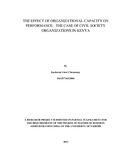The effect of organizational capacity on performance: The case of civil society organizations in Kenya
| dc.contributor.author | Chematany, Kachuwai L | |
| dc.date.accessioned | 2013-02-28T14:38:16Z | |
| dc.date.issued | 2012-11 | |
| dc.identifier.citation | MBA | en |
| dc.identifier.uri | http://erepository.uonbi.ac.ke:8080/xmlui/handle/123456789/12549 | |
| dc.description.abstract | Many concerns have been raised about the capacity of civil society organizations (CSOs) in Kenya, especially by donors seeking to support their programs. However, little empirical evidence on the organizational capacity of CSOs in Kenya exists. This study analyzed the correlation between organizational capacity factors and organizational performance measures. The use of structured survey was applied with pen and paper closed-ended questions. The results were analyzed using factor analysis (rotated) and Chi-square to test the null hypothesis to establish the association between the capacity and the performance level of the CSOs. The null hypothesis of the study was that there is no significant difference between the performance levels of organizations using goal model and those that do not. Χ2 yielded a p=7.844 which was greater than the 0.05 threshold. Therefore the null hypothesis was rejected. There was a significant difference in the performance levels of CSOs using the goal model and those that do not. Organizations using the goal model perform better than those that do not. There is a correlation between organizational capacity and organizational performance of CSOs in Kenya. These results provide evidence for the need of structured and continuous assessment organizational capacity and its effect on performance of CSOs in Kenya. | en |
| dc.language.iso | en | en |
| dc.title | The effect of organizational capacity on performance: The case of civil society organizations in Kenya | en |
| dc.type | Thesis | en |
| local.publisher | School of Business | en |

